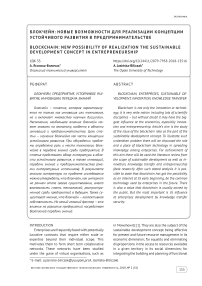Блокчейн: новые возможности для реализации концепции устойчивого развития в предпринимательстве
Автор: Ясинска-биличак А.
Журнал: Вестник Витебского государственного технологического университета @vestnik-vstu
Рубрика: Экономика
Статья в выпуске: 2 (35), 2018 года.
Бесплатный доступ
Блокчейн - понятие, которое характеризуется не только как инновация или технология, но и включает множество научных дисциплин. Несомненно, наибольшее влияние блокчейн может оказать на экономику, особенно в области инноваций и предпринимательства. Цель статьи - изучение блокчейна как части концепции устойчивого развития. При обсуждении проблемы определена роль и место технологии блокчейна в передаче знаний среди предприятий. В статье представлен обзор литературы в области устойчивого развития, а также инноваций, передачи знаний и предпринимательства (анализ литературных источников). В результате анализа литературы по проблеме исследования можно утверждать, что блокчейн, как интернет на раннем этапе своего существования, имеет возможность стать технологией, распространенной среди предприятий в будущем. Также существует мнение, что блокчейн - коллективная собственность. Но самый главный фактор - это влияние на развитие предприятий посредством безопасной передачи знаний.
Предприятия, инновации, устойчивое развитие, блокчейн, передача знаний
Короткий адрес: https://sciup.org/142216177
IDR: 142216177 | DOI: 10.24411/2079-7958-2018-13516
Список литературы Блокчейн: новые возможности для реализации концепции устойчивого развития в предпринимательстве
- Mowshowitz, A. (1997), Virtual organization. Commune. ACM 40, 9 (September 1997), -=http://dx.doi.o DOI: rg/10.1145/260750.260759
- Malik, K., Jasińska-Biliczak, A. (2018), Innovations and Other Processes as Identifiers of Contemporary Trends in the Sustainable Development of SMEs: The Case of Emerging Regional Economies, Sustainability, 10(5), pp. 1-17
- Benda-Prokeinova, R., Dobes, K., Mura, L., Buleca, J. (2017), Engel's approach as a tool for estimating consumer behaviour, E & M Ekonomie a Management, Vol. 20, Issue 2, pp. 15-29, DOI: 10.15240/tul/001/2017-2-002
- McGowan, P., Innowacje i przedsiębiorczość wewnętrzna, In Praktyka kierowania, 1st ed.; Stewart D.M., Ed.; PWE, Warszawa, Poland, 1994, pp. 281-283.
- Jasińska-Biliczak, A., Sitkowska, R. (2014), Influence of small and medium enterprises sector at the change of innovation potential of Polish regions, Grant Journal, (3/01), pp. 57-61.
- Mehandjiev, N. Grefen, P., Dynamic Business Process Formation for Instant Virtual Enterprises 1st ed. Heidelberg: Springer 2010. (Advanced Information and Knowledge Processing).
- Gartner A., Blockchain-Based Transformation: A Gartner Trend Insight Report, 2018, available at https://www.gartner.com/doc/3869696/blockchainbased-transformation-gartner-trendinsight?docdisp=share&srcId= 1-4398736771.
- Hileman, G., Rauchs, M., Global Blockchain Benchmarking Study 2017, September 22, 2017, аvailable at SSRN: https:/ssrn.com/abstract=3040224 or http:/dx.doi.org/10.2139/ssrn.3040224.
- Merkevicius, J., Davidaviciene, V., Radeliuniene, J., Buleca, J. (2015), Virtual organization: Specifics of creation of personnel management system, E & M Ekonomie a Management, Vol. 18, Issue 4, pp. 200-211, 014 DOI: 10.15240/tul/001/2015-4-
- Furlonger, D., Valdes R., Practical Blockchain: A Gartner Trend Insight Report, Gartner Inc., 2017.
- Bernat, M., Bruska, A., Jasińska-Biliczak, A. (2017), Influence of the Cultural Background at Small and Medium Sized-Enterprises Innovations in Regional Dimension (No. 12/2017).
- Kuznetsov, M. Why Blockchain matters to small businesses, the Entrepreuner, 9th January 2018.
- Lovelock, J. D., Furlonger, D., Three things CIOs need to know about blockchain business value forecast, Gartner Inc., August 2, 2017.
- La Croce, C., Heath, M., New IDC Spending Guide Forecasts Western European Blockchain Spending to Grow to $1.8 Billion by 2021, IDC, Milan 2018, p. 4.
- Probst, L., Lefebvre, V., Martinez-Diaz, Ch., Bohn, N. U., PwC and Klitou, D., Conrads, J., CARSA, (2018), Digital Transformation Scoreboard 2018. EU businesses go digital: Opportunities, outcomes and uptake, European Commission, Luxembourg, pp. 7-21.
- Atomico, The State of European Tech Survey, 2018, p. 11.
- Jasińska-Biliczak, A., Kowal, J., Hafner, J. (2016), Innovative Capacity in Small Regional Enterprises in Transition Economies: An Exploratory Study in Poland.
- Swan, M. (2015), Blockchain. Blueprint for New Economy, O"Reilly Media.
- Tapscott, D., Tapscott, A. (2016), Blockchain revolution: how the technology behind bitcoin is changing money, business and the world. Penguin.
- Allen, D. W. E., MacDonald, T., Potts, J. Block-chains and the Boundaries of Self-Organized Economies: Predictions for the Future of Banking (March 18, 2016), аvailable at: SSRN: https:/ssrn.com/abstract=2749514 or http:/dx. doi.org/10.2139/ssrn.2749514.
- Davidson, S., De Filippi, P., Potts, J. (2016), Economics of Blockchain, available at: SSRN: https:/ssrn.com/abstract=2744751 or http:/dx. doi.org/10.2139/ssrn.2744751.
- Monterde, A., Calleja-López, A., Aguilera, M., Barandiaran, X. E., Postill, J. (2015), Multi-tudinous identities: a qualitative and network analysis of the 15M collective identity, Information, Communication & Society, DOI: 10.1080/1369118X.2015.1043315
- Porter, M. E. (1985), The Competitive Advantage: Creating and Sustaining Superior Performance. NY: Free Press.
- Tapscott, D., Tapscott, A. (2017), Blockchain Revolution, New Global Studies, vol. 11, issue 1, https://EconPapers.repec.org/RePEc:bpj:nglost: v:11:y:2017:i:1:p:47-53:n:1.


